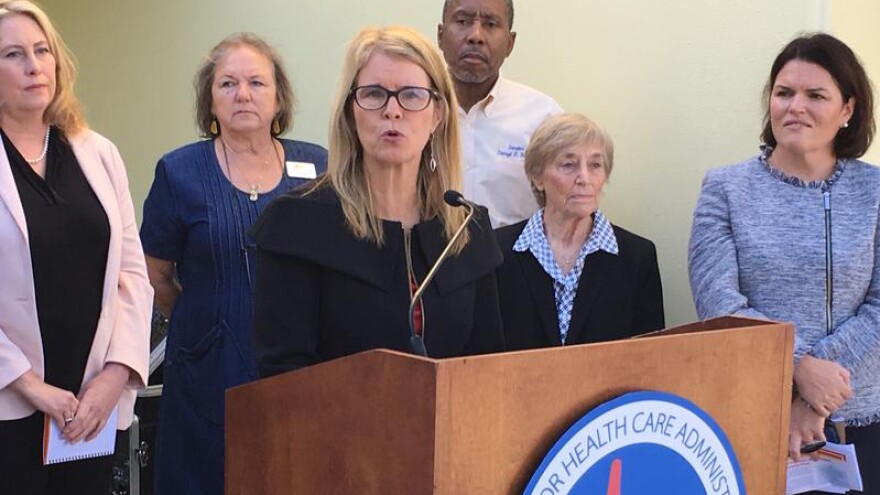Gov. Ron DeSantis’ budget proposal, released last month, provides Floridians with some insight into his health care priorities for 2020.
From hospital funding to more money for the state’s embattled Medicaid waiver program for people with disabilities, the governor’s proposals could meet resistance in the Legislature.
Health News Florida's Julio Ochoa sat down with Mary Mayhew, secretary of the state's Agency for Health Care Administration to talk about the budget proposal.
They start by discussing funding for disabled people, including $95 million in new Medicaid funding and another $240 million to offset budget deficits in the Agency For Persons with Disabilities.
This proposed funding comes at a time when the Legislature has been debating an overhaul of the Medicaid waiver program. Do you think this proposal will impact those plans in the Legislature?
The focus for the governor in his budget is to preserve the vital safety net. And within Medicaid, the core mission is to serve individuals who are elderly, the disabled and extremely low-income families. When we talk about individuals with intellectual and developmental disabilities, we're talking about the 45-year-old with Down syndrome who is living with his parents who are 85 years old. What the Legislature is focused on, what the governor is focused on, is how do we give peace of mind to that 85-year-old couple when they're no longer able to or no longer around that their son is going to be properly taken care of? That's at the heart of this discussion. We know that we have a rapidly aging group of individuals. This truly is cradle-to-grave in terms of the significant needs of these individuals and their need to depend on state government.
Do you think the governor is using this money to show that this is a priority for his administration?
He is absolutely acknowledging the increased costs that have occurred over the last few years and we are working collaboratively with the Legislature. This is challenging. We don't live in a world of unlimited resources. So we have to and the Legislature has to evaluate a number of competing priorities. But this is truly a fundamental core responsibility of the Medicaid program.
The governor also included $20 million in his budget proposal to implement the Canadian drug importation law that passed in the spring. How will that money be spent?
This is an opportunity and a priority for the governor to dramatically address the skyrocketing cost of prescription drugs. We are pursuing this path to get approval from the federal government to allow the importation of prescription drugs from Canada to support these state programs that today incur significant costs: the Department of Corrections, Medicaid, the Department of Children and Families. What we still need is an entity or vendor that will help to administer the program, be responsible for all of the quality and safety requirements that we expect will be established by the federal government. That $20 million dollar request is to support that contract. We have forecast around $150 million in savings annually as a result of this effort.
So is this a one-time, startup cost or do you imagine that this will be an ongoing yearly cost?
Given the expectations on this vendor, the work that needs to be done to constantly monitor where the prescription drugs are coming from, to verify that they are safe, to comply with the track and trace requirements under the Food and Drug Administration, these will be ongoing costs.
Florida is still waiting for federal approval of this program. Are you confident that that will happen?
I am confident that the president of the United States, President Trump, has made this a priority, has made this commitment to Governor DeSantis, and that he is creating a sense of urgency on the federal Department of Health and Human Services.
What do you think is holding it up?
I think that there are other interests who do not want this to occur. That the pharmaceutical industry that opposed this from day one is continuing to create opposition in Washington.
Have you been given any sort of timeline about when this approval might come through?
We have not seen any timeline at this point other than this summer when the department did announce that they were planning to promulgate rules. And that is a significant announcement and a huge departure. This dates back to a law that was passed in 2003 for which there has been no activity within the federal agency. So that is a huge step in the right direction.
On to hospital funding. It appears in this budget that the governor did not propose cutting Medicaid funding for hospitals and nursing homes that care for the poor, elderly and disabled people. He also preserved hundreds of millions of dollars in Medicaid funds for 29 hospitals with large Medicaid caseloads. That has been a source of debate in the Legislature in the past. Where does the administration stand on that?
The governor is interested in seeing a longer term strategy for hospital payments, one that is driving efficiency and effectiveness: that we are evaluating the quality of the outcomes, that we are preserving vital access to individuals who are on Medicaid who are uninsured. Right now, we still have a number of different programs that have been in place for some time that clearly we would like an opportunity to evaluate so that we're looking five years out, 10 years out. Where do we need to see the hospital system in Florida and how do we support that through payment and policy reform?




